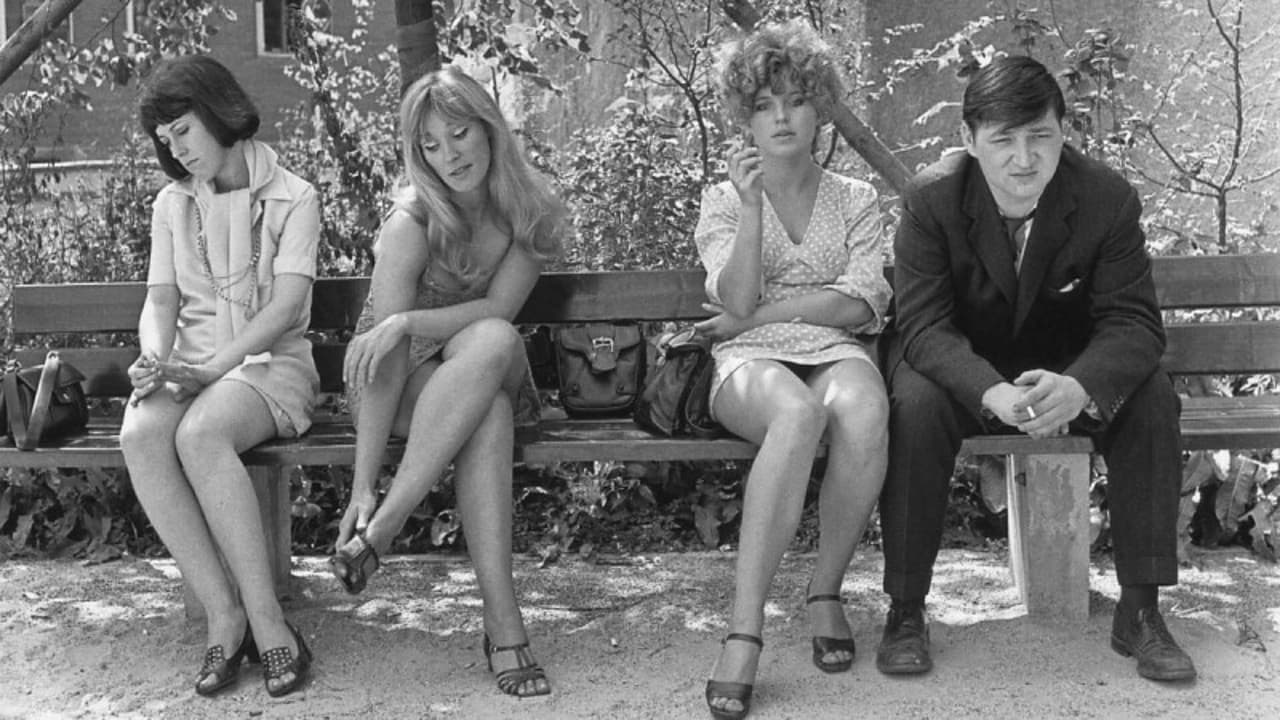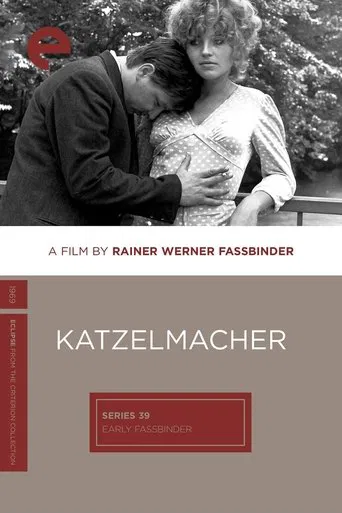

And with that description, I also include myself. "Katzelmacher" is an early career work by German writer and director Rainer Werner Fassbinder. He was in his early 20s still when he made this one and you see by the fact that it is in black-and-white that it's from early in his career, one of his first two full feature films. The cast includes a handful of actors that he worked with on a regular basis, most of all the really young Hanna Schygulla. It's a West German production and of course in German language. Here we have a film that will have its 50th anniversary soon. It runs for approximately 90 minutes and thus is among Fassbinder's shorter works. But I also feel it is among his more difficult to access. I struggled with caring for the characters at all, possibly because the focus is entirely on the dialogues here and very rarely only on what the characters are doing. It's all about the talk. One major plot point is how they deal with a Greek immigrant (which makes it a pretty current issue too), how they talk without respect about him on some occasions, but try to get together with him when they are alone with him. I am talking about the women of course. The Greek guy is played by Fassbinder himself and he is once again a scene stealer. His scenes were the best of the entire film. This movie received a great deal of awards recognition and it was a major success for Fassbinder, especially with the German Film Awards almost half a century later. But like I said, it's a very bleak sterile movie that is certainly not for everybody, possibly not the best choice to start getting into Fassbinder.
... View MoreOf all the films that make me laugh out loud, "Katzelmacher is probably the blackest. How else to justify the enjoyable quality of a movie in which almost all the characters, if not human scum, act that way most of the time. Make no mistake, the young Fassbinder knew exactly what he was doing when he made this early brilliant piece. Every shot has been planned with a single mindedness that enhances the meaningfulness of his exploration of xenophobia and its causes in dissatisfaction with financial circumstances and unfulfilled human relationships. Some eight or so young people of mixed sex pass their time in mainly useless activities. When they are not having it off with one another, generally in a lacklustre way, or playing cards in the local café they spend the time lounging about in the street outside an apartment building, their apartness from each other expressed in the horizontal line they form as they lean against a railing generally staring towards the camera. The building behind is not a slum. It could be a middle class dwelling in any town. The white wall behind is punctuated by windows with flower boxes. This and other settings are never sordid, merely dull. Inside buildings, by seldom moving, the camera reflects the inertia of these aimless people. For the first third of the film nothing much happens. Then there is the sudden entry of a young Greek worker, played by Fassbinder himself, to ignite the latent xenophobic prejudices of the rest of the cast. They wind each other up by exaggerating all those qualities they feel the Greek might have, including being a rapist and worst of all a communist. The men need little to start them off once they learn from one who shares a lodging with the Greek that he has a bigger dick than the rest of them. For the women it is the unfounded rape allegation that sparks indignation and a call for vigilante violence. At the same time as being enormously funny, this part of the film in its depiction of xenophobia as the product of ignorance is hammered home with ferocious integrity. Perhaps the most original touch is the punctuation of the action at various points with brief sequences in which different pairs of characters stroll very slowly between the same two rows of garages to the accompaniment of a badly over-pedalled performance of a piano Schubert waltz. Their laconic comments have the function of a kind of Greek chorus, binding the film together in a curiously subtle way. If you are looking for an early Fassbinder gem, "Katzelmacher" is the one I would recommend.
... View MoreKatzelmacher changed many people's lives when it came out. One has to wonder how exponential the effects were, but the waves that films like this make are usually much greater than most viewers can fathom. (For example, although very few people are familiar with John Cassavetes' Shadows, that film affected Martin Scorsese profoundly.)In the interesting documentary, I Don't Just Want You To Love Me, Fassbinder claims that he didn't move the camera much during this time for aesthetic reasons. His cinematographer (Dietrich Lohmann), however, says that aesthetics had little to do with it; they simply couldn't easily move the bulky camera and dolly, and they had no budget to rent better equipment.This film is part of an experimental avalanche, and it is amazing. The particular art house feel is a result of the times, and as Fassbinder moves on it is fascinating to contemplate how he gets his message across, using different styles. He was truly fearless, and all of his stuff is worth serious consideration.Katzelmacher becomes even more interesting after viewing his later work.
... View MoreSome geniuses are made, not born. Fassbinder, who has become one of my very favorite directors, did not begin his career making masterpieces, but clumsy art films. Katzelmacher is the story of a group of bored Germans, several men and several women, who spend their lives sitting, talking, smoking, and screwing each other (often for money). They treat each other like garbage, though they are too lazy to do any real damage. However, when a Greek immigrant rents an apartment from one of them, their cruelty becomes more and more tangible. The women begin spreading rumors about how the Greek (incidentally played by Fassbinder himself) is sleeping with certain members of the group and how he has tried to assault a couple of them. The men call him a communist behind his back, and then right to his face, as he speaks almost no German. When the Greek actually begins dating one of them (played by Fassbinder's most beloved actress, Hanna Schygulla), their threats no longer remain merely threats. It's a great story, really, and, if done in Fassbinder's more honed melodrama style, one of the most unique directorial voices we'll ever hear, it could have been a great film. But, in this early stage (this was his second feature film), Fassbinder was more of an avant-guard artist, striving towards Brecht, I suppose, and maybe looking towards the French New Wave. The results are mixed, but mostly leaning towards the annoying side. The film plays like a 90 minute Calvin Klein ad, with the camera lingering too long on motionless, disinterested performers. One of the better scenes has one of the actresses singing an American song in a delightfully amateurish manner while dancing. Somehow this is very beautiful. There is a repeated scene where two characters will walk forward on the same street, arm in arm, with soft piano music in the background (the only extra-diagetic music in the film). This gimmick didn't work very well. While there are some beautiful bits of the film besides the aforementioned dance, the relationship between Fassbinder and Schygulla is rather gentle and melancholy it pretty much fails. It's very worth seeing, however, if you're interested in the way Fassbinder's amazing career developed.
... View More